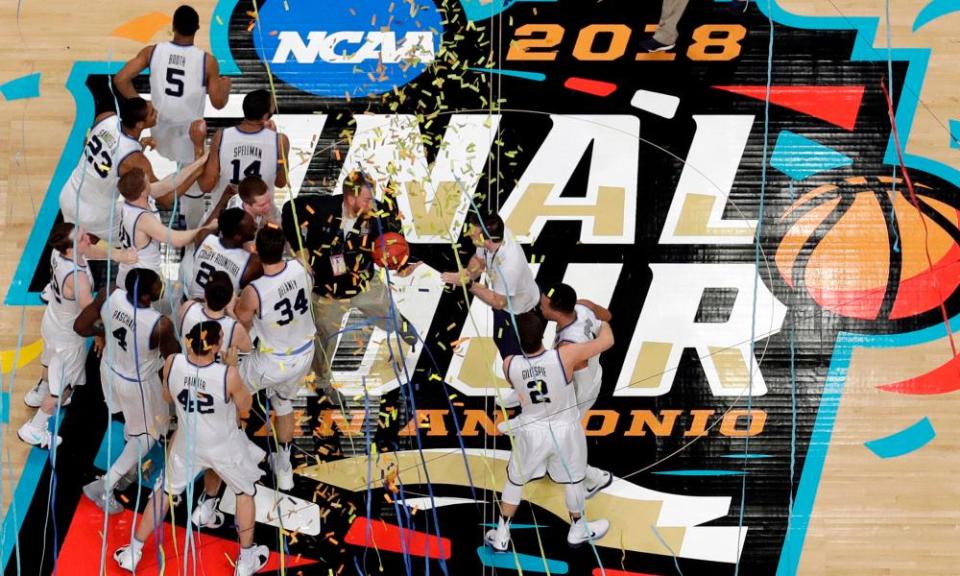New college basketball guidelines only strengthen a rotten, exploitative system
Condoleezza Rice had the chance to change a sport that makes money off players who are often from poor backgrounds. She failed badly

There are few sports systems more exploitive than American college basketball. The NCAA is a $1bn business in which colleges, administrators, coaches and television networks get rich at the expense of (mostly African American) players who often hail from some of the US’s most challenged neighborhoods. As amateurs these kids do not get paid, although they are the ones fans pay good money to watch. No wonder most people consider the set-up to be a mess.
When the FBI exposed a common practice of shoe companies and agents paying summer league coaches to steer players to preferred universities, the NCAA had a chance to clean house. It asked former US secretary of state Condoleezza Rice to head a commission that would recommend reform. It said it expected Rice’s commission to be harsh; it said it wanted the suggested change to be bold.
On Wednesday, Rice’s commission delivered the report, 60 pages long. And, as promised, it was harsh. It was bold. So harsh and so bold, in fact, that many of its recommendations will be difficult to enforce. It said the NCAA should take over the summer leagues now run by the Amateur Athletic Union. It said coaches who slip payments to players should be given draconian punishments. It said those coaches’ schools should potentially lose five years of lucrative postseason tournament revenue that is actually used to fund less-visible sports programs like swimming, soccer and track.
These mandates will rock a college system in which coaches are accustomed to what amounts to a slap on the wrist for violating the NCAA’s amateurism rules. But in strengthening punishment for what most in American sports call “cheating”, Rice’s commission fortified the system that is college basketball’s biggest issue.
The problem with Rice’s commission is that it was rigged from the start – filled with lawyers, politicians, athletic department officials and well-to-do former players who hail from decades inside the establishment. They are not activists looking to blow up a bad system but protectors of the structure that takes advantage of players. They weren’t looking to end the inequalities of college basketball. They were searching for external villains they could charge with defiling the purity of the NCAA’s amateur system.
Rice barely touched on the issue that has made college basketball a cesspool. She danced quickly over the idea of paying players – or at least allowing them to make money marketing themselves, in the same way their colleges peddle their names and images for profit. She said the subject is currently in the courts, through lawsuits challenging the NCAA’s interpretation of “amateurism” and therefore she didn’t want to touch it.
“Given the lack of legal clarity on this matter, the commission was concerned about the unintended consequence of such changes,” Rice wrote, adding that the NCAA shouldn’t consider paying athletes until “the legal context changes or clarifies.”
Rice’s words appeared 38 pages into the report. They should have been in the first paragraph because they summed up the commission’s true intent. Her group wasn’t gathered to bring solutions to college basketball’s biggest failings. They were there to wag an admonishing finger at the outside influences who feed off the game’s rotten core. Her argument about pending litigation was a spineless dodge, a dance around the festering truth that threatens to destroy college basketball.
Any commission on college basketball reform that refuses to take up the issue of paying players is a commission that really doesn’t want to fix college basketball.
Instead they poured out 60 pages of elitist ramblings, scorching shoe companies and summer league coaches and players who dare to ask for a cut of the pie being made off their labors. They decried the summer leagues as “a harmful influence on college basketball” without acknowledgement that those summer league coaches are often among the few people college prospects can trust in their neighborhoods. Yes, many of those coaches may get kickbacks, but in a world where kids grow up feeling disenfranchised, those same coaches are fathers, uncles and mentors: more family to players than the college officials making money from their from their skills.
Rice’s commission chose to skip around the untidy subjects. They bashed the one-and-done rule (negotiated by the NBA and their players’ union) that mandates all players have to play at least a year of college to be eligible for the NBA draft but didn’t address the hundreds of millions colleges receive from shoe companies. They admonished impoverished players who take payments funneled by those same shoe manufacturers to attend one of the brand’s preferred schools and yet said nothing about the system that leads players to want a piece for themselves.
“We all know parents and student athletes who do the right thing even if the temptations are there,” Rice later told ESPN. “I’ve never been particularly enamored of the argument, ‘well there are temptations so I have to take them.’”
The unfortunate thing is that Rice’s commission held such promise. For once, it seemed, college basketball understood the system has problems. They said they wanted to be better. They finally appeared to get the optics of poor kids getting nothing while everyone else gets rich. For once it seemed they weren’t going to brag about free college for players whose sports commitments barely allow them to get to class.
Instead, they barricaded the walls of the old system against attacks from the outside. They blamed and shamed the victims. At some point you’d think they noticed the smell of a system rotting all around them.

